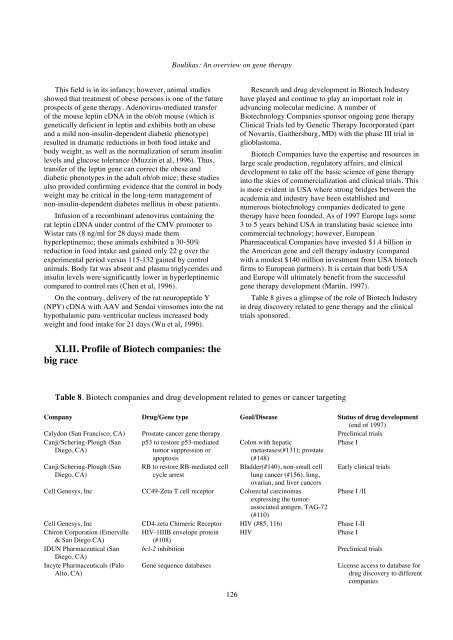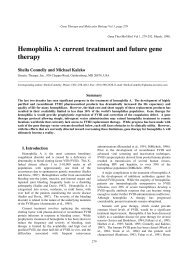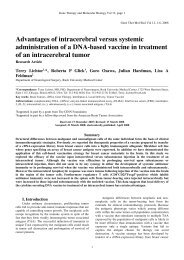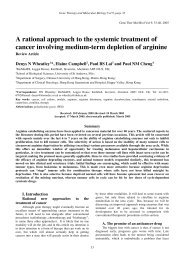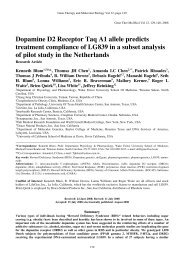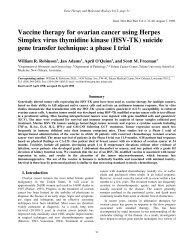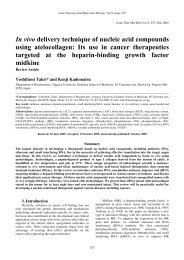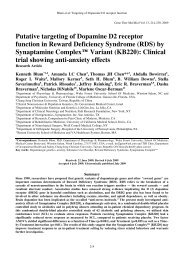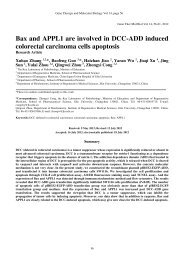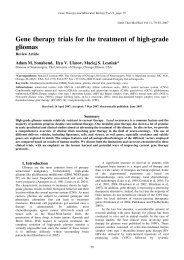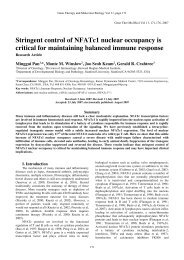01. Gene therapy Boulikas.pdf - Gene therapy & Molecular Biology
01. Gene therapy Boulikas.pdf - Gene therapy & Molecular Biology
01. Gene therapy Boulikas.pdf - Gene therapy & Molecular Biology
You also want an ePaper? Increase the reach of your titles
YUMPU automatically turns print PDFs into web optimized ePapers that Google loves.
This field is in its infancy; however, animal studies<br />
showed that treatment of obese persons is one of the future<br />
prospects of gene <strong>therapy</strong>. Adenovirus-mediated transfer<br />
of the mouse leptin cDNA in the ob/ob mouse (which is<br />
genetically deficient in leptin and exhibits both an obese<br />
and a mild non-insulin-dependent diabetic phenotype)<br />
resulted in dramatic reductions in both food intake and<br />
body weight, as well as the normalization of serum insulin<br />
levels and glucose tolerance (Muzzin et al, 1996). Thus,<br />
transfer of the leptin gene can correct the obese and<br />
diabetic phenotypes in the adult ob/ob mice; these studies<br />
also provided confirming evidence that the control in body<br />
weight may be critical in the long-term management of<br />
non-insulin-dependent diabetes mellitus in obese patients.<br />
Infusion of a recombinant adenovirus containing the<br />
rat leptin cDNA under control of the CMV promoter to<br />
Wistar rats (8 ng/ml for 28 days) made them<br />
hyperleptinemic; these animals exhibited a 30-50%<br />
reduction in food intake and gained only 22 g over the<br />
experimental period versus 115-132 gained by control<br />
animals. Body fat was absent and plasma triglycerides and<br />
insulin levels were significantly lower in hyperleptinemic<br />
compared to control rats (Chen et al, 1996).<br />
On the contrary, delivery of the rat neuropeptide Y<br />
(NPY) cDNA with AAV and Sendai virosomes into the rat<br />
hypothalamic para-ventricular nucleus increased body<br />
weight and food intake for 21 days (Wu et al, 1996).<br />
XLII. Profile of Biotech companies: the<br />
big race<br />
<strong>Boulikas</strong>: An overview on gene <strong>therapy</strong><br />
126<br />
Research and drug development in Biotech Industry<br />
have played and continue to play an important role in<br />
advancing molecular medicine. A number of<br />
Biotechnology Companies sponsor ongoing gene <strong>therapy</strong><br />
Clinical Trials led by <strong>Gene</strong>tic Therapy Incorporated (part<br />
of Novartis, Gaithersburg, MD) with the phase III trial in<br />
glioblastoma.<br />
Biotech Companies have the expertise and resources in<br />
large scale production, regulatory affairs, and clinical<br />
development to take off the basic science of gene <strong>therapy</strong><br />
into the skies of commercialization and clinical trials. This<br />
is more evident in USA where strong bridges between the<br />
academia and industry have been established and<br />
numerous biotechnology companies dedicated to gene<br />
<strong>therapy</strong> have been founded. As of 1997 Europe lags some<br />
3 to 5 years behind USA in translating basic science into<br />
commercial technology; however, European<br />
Pharmaceutical Companies have invested $1.4 billion in<br />
the American gene and cell <strong>therapy</strong> industry (compared<br />
with a modest $140 million investment from USA biotech<br />
firms to European partners). It is certain that both USA<br />
and Europe will ultimately benefit from the successful<br />
gene <strong>therapy</strong> development (Martin, 1997).<br />
Table 8 gives a glimpse of the role of Biotech Industry<br />
in drug discovery related to gene <strong>therapy</strong> and the clinical<br />
trials sponsored.<br />
Table 8. Biotech companies and drug development related to genes or cancer targeting<br />
Company Drug/<strong>Gene</strong> type Goal/Disease Status of drug development<br />
(end of 1997)<br />
Calydon (San Francisco, CA) Prostate cancer gene <strong>therapy</strong> Preclinical trials<br />
Canji/Schering-Plough (San<br />
Diego, CA)<br />
Canji/Schering-Plough (San<br />
Diego, CA)<br />
p53 to restore p53-mediated<br />
tumor suppression or<br />
apoptosis<br />
RB to restore RB-mediated cell<br />
cycle arrest<br />
Colon with hepatic<br />
metastases(#131); prostate<br />
(#148)<br />
Bladder(#140), non-small cell<br />
lung cancer (#156), lung,<br />
ovarian, and liver cancers<br />
Phase I<br />
Early clinical trials<br />
Cell <strong>Gene</strong>sys, Inc CC49-Zeta T cell receptor Colorectal carcinomas<br />
expressing the tumorassociated<br />
antigen, TAG-72<br />
(#110)<br />
Phase I /II<br />
Cell <strong>Gene</strong>sys, Inc CD4-zeta Chimeric Receptor HIV (#85, 116) Phase I-II<br />
Chiron Corporation (Emerville HIV-1IIIB envelope protein HIV Phase I<br />
& San Diego CA)<br />
(#108)<br />
IDUN Pharmaceutical (San<br />
Diego, CA)<br />
bcl-2 inhibition Preclinical trials<br />
Incyte Pharmaceuticals (Palo<br />
Alto, CA)<br />
<strong>Gene</strong> sequence databases License access to database for<br />
drug discovery to different<br />
companies


